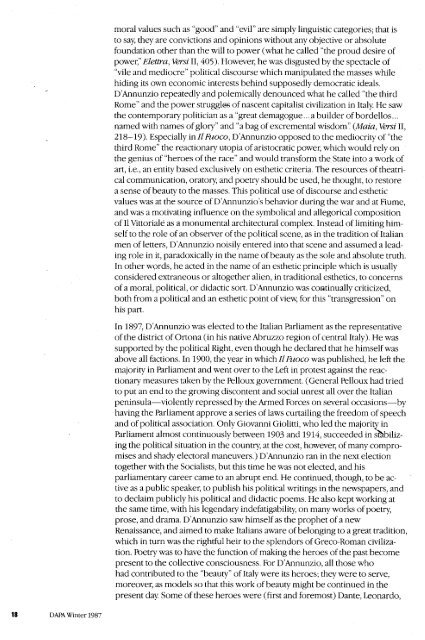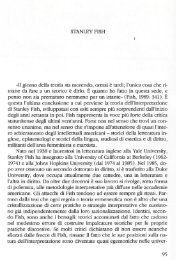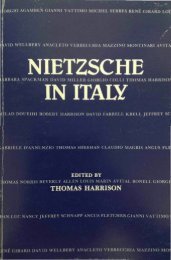The Journal of Decorative and Propaganda Arts - UCLA Department ...
The Journal of Decorative and Propaganda Arts - UCLA Department ...
The Journal of Decorative and Propaganda Arts - UCLA Department ...
You also want an ePaper? Increase the reach of your titles
YUMPU automatically turns print PDFs into web optimized ePapers that Google loves.
t8 DAPA\finter 1987<br />
moral values such as "good" <strong>and</strong> "evil" are simply linguistic categories; that is<br />
to say, they are convictions <strong>and</strong> opinions without any objective or absolute<br />
foundation other than the will to pov/er (what he called "the proud desire <strong>of</strong><br />
power," Elettra,VersiII,405). However, he was disgusted by the spectacle <strong>of</strong><br />
"vile<br />
<strong>and</strong> mediocre" political discourse which manipulated the masses while<br />
hiding its ovln economic interests behind supposedly democratic ideals.<br />
D'Annunzio repeatedly <strong>and</strong> polemically denounced what he called "the third<br />
Rome" <strong>and</strong> the power struggle-€ <strong>of</strong> nascent capitalist civilization in Italy He saw<br />
the contemporary politicianas a "great demagogue...a builder <strong>of</strong> bordellos...<br />
named with names <strong>of</strong> glory" <strong>and</strong>"a bag <strong>of</strong> excremental wisdom". (Maia,VersilI,<br />
218-19). Especially in Il R.roco, D'Annunzio opposed to the mediocrity <strong>of</strong> "the<br />
third Rome" the reactionary utopia <strong>of</strong> aristocratic pov/er, which would rely on<br />
the genius <strong>of</strong> "heroes <strong>of</strong> the race" <strong>and</strong> would transform the State into a work <strong>of</strong><br />
art,i.e., an entity based exclusively on esthetic criteria. <strong>The</strong> resources <strong>of</strong> theatrical<br />
communication, oratory <strong>and</strong> poetry should be used, he thought, to restore<br />
a sense <strong>of</strong> beauty to the masses. This political use <strong>of</strong> discourse <strong>and</strong> esthetic<br />
values was at the source <strong>of</strong> D'Annunzio's behavior during the war <strong>and</strong> at Fiume,<br />
<strong>and</strong> was a motivating influence on the symbolical <strong>and</strong> allegorical composition<br />
<strong>of</strong> Il Vittoriale as a monumental architectural complex. Instead <strong>of</strong> limiting himself<br />
to thg role <strong>of</strong> an observer <strong>of</strong> the political scene, as in the tradition <strong>of</strong> Italian<br />
men <strong>of</strong> letters, D'Annunzio noisilv entered into that scene <strong>and</strong> assumed aleading<br />
role in it, paradoxically in the name <strong>of</strong> beauty as the sole <strong>and</strong> absolute truth.<br />
In other words, he acted in the name <strong>of</strong> an esthetic principle which is usually<br />
considered extraneous or altogether alien, in traditional esthetics, to concerns<br />
<strong>of</strong> a moral, political, or didactic sort. D'Annunzio was continually criticized,<br />
both from a political <strong>and</strong> an esthetic point <strong>of</strong> vieul for this "transgression" on<br />
his part.<br />
ln 1897, D'Annunzio was elected to the Italian Parliament as the representative<br />
<strong>of</strong> the district <strong>of</strong> Ortona (in his native Abruzzo region <strong>of</strong> central Italy). He was<br />
supported by the political Right, even though he declared that he himself was<br />
above all factions. In 1900, the year inwhichll Rtocowas published, he left the<br />
majority in Padiament <strong>and</strong> went over to the Left in protest against the reactionary<br />
measures taken by the Felloux government. (General Felloux had tried<br />
to put an end to the growing discontent <strong>and</strong> social unrest all over the Italian<br />
peninsula-violently repressed by the Armed Forces on several occasions-by<br />
having the Farliament approve a series <strong>of</strong> laws curtailing the freedom <strong>of</strong> speech<br />
<strong>and</strong> <strong>of</strong> political association. Only Giovanni Giolitti, who led the maioriry in<br />
Parliament almost continuously between 1903 <strong>and</strong> 1914, succeeded in silbilizing<br />
the political situation in the country at the cost, howeveq <strong>of</strong> many compromises<br />
<strong>and</strong> shady electoral maneuvers.) D'Annunzio ran in the next election<br />
together with the Socialists, but this time he was not elected, <strong>and</strong> his<br />
parliamentary career came to an abrupt end. He continued, though, to be active<br />
as a public speaker, to publish his political writings in the newspapers, <strong>and</strong><br />
to declaim publicly his political <strong>and</strong> didactic poems. He also kept working at<br />
the same time, with his legendary indefatigability, on manyworks <strong>of</strong> poetry<br />
prose, <strong>and</strong> drama. D'Annunzio saw himself as the prophet <strong>of</strong> a new<br />
Renaissance, <strong>and</strong> aimed to make Italians aware <strong>of</strong> belonging to a great tradition,<br />
which in turn was the rightful heir to the splendors <strong>of</strong> Greco-Romancivlliza<br />
tion. Foetry was to have the function <strong>of</strong> making the heroes <strong>of</strong> the past become<br />
present to the collective consciousness. For D'Annunzio, all those who<br />
had contributed to the "beauty" <strong>of</strong> Italy were its heroes; they were to serve,<br />
moreove! as models so that this work <strong>of</strong> beauty might be continued in the<br />
present day Some <strong>of</strong> these heroes were (first <strong>and</strong> foremost) Dante, Leonardo,




